9:30am-11am National Press Club Washington, D.C.
Speakers: Jonathan Davidson, Senior Advisor for Political and Academic Affairs, European Commission Delegation to the U.S. Corrado Pirzio-Biroli, Head of the Cabinet of former EU Commissioner Franz Fischler Omer Taspinar, Director, Turkey Program, The Brookings Institution
Moderator: Luis Lugo, Director, Pew Forum on Religion & Public Life
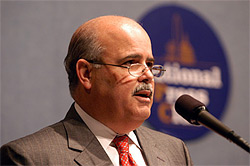
LUIS LUGO: There may be other folks showing up because the original announcement indicated a 10:00 starting time and then we had to bring it forward. So don’t be surprised if we have other folks coming in and joining us.
Good morning and thank you all for joining us today. My name is Luis Lugo and I am the director of the Pew Forum on Religion and Public Life, a project of the Pew Research Center. The forum is a nonpartisan organization and does not take positions on policy debates, including the issue under consideration this morning. It is my pleasure to welcome you to what we believe will be a lively and informative discussion of the religious, cultural and political implications of Turkey’s efforts to become a full-fledged member of the European Union.
As all of you are aware, last month the EU voted to begin full membership negotiations with Turkey, a country whose population is almost entirely Muslim. It is important to keep in mind that the end result of these negotiations is by no means certain. There are significant challenges ahead for Turkish accession. Among other things, the debate over Turkey has reminded many Europeans that when the EU came into being more than 50 years ago, many of its architects saw it as a Christian club. Now, today, Europe of course is a largely secular region, yet the Continent’s Christian heritage still exerts a powerful influence over public and even elite opinion in some quarters.
Interestingly, opposition to Turkish accession is coming from secular as well as religious quarters in Europe. Some nonreligious Europeans worry that bringing a large Muslim country into the EU could endanger the Continent’s tradition of gender equality and tolerance of alternative lifestyles, for instance. For traditionalists, Turkish accession threatens the very idea of Europe as a Christian civilization.
Opinion polls in France, Germany and other European countries showing majorities opposed to Turkish membership is just one sign of this underlying anxiety. I’m told that in Turkey too there is some anxiety, albeit not at the level one sees in Europe. The country’s ruling party, like previous Turkish governments, supports membership in the EU, as does a majority of Turkey’s population. But some in Turkey, particularly those who want to see a greater role for Islam in Turkish public life, fear that entry into the European Union could undermine the nation’s religious and cultural identity. The recent debate on the proposal by the Turkish government to criminalize adultery is a good example of the cultural and religious differences that will need to be bridged.
In contrast, many Europeans who favor Turkish accession argue that bringing a large Muslim country into the EU would help make Europe a model for the world – of civilization bridging and multiculturalism. These supporters argue that Turkish membership would create a symbolic and actual bulwark against the darker forces within Islam that are fueling the terrorist assault on the West. As German Foreign Minister Joschka Fischer recently told the BBC, “To modernize an Islamic country based on the shared values of Europe would be almost a D-Day for Europe in the war against terror. It would be the greatest positive challenge for these totalitarian and terrorist ideas.” Many American policymakers also see a Turkey securely anchored in the EU as a powerful model of moderation and democracy for the rest of the Muslim world, particularly countries on Turkey’s border such as Iraq and Iran.
Now, to examine the possible outcome and impact of these negotiations we have with us today a distinguished panel of experts with different perspectives on these issues. Our first speaker, Jonathan Davidson, is a senior advisor for political affairs with the European Commission Delegation here in Washington. He served in the British Diplomatic Service from 1963 to 1981, and in his stint with the British Embassy here in Washington was responsible for congressional liaison, as well as serving as head of Information and Press Relations. Jonathan is an adjunct professor at Johns Hopkins University and American University here in town.
Corrado Pirzio-Biroli, who will speak next, has just stepped down as the head of Cabinet for former EU commissioner Franz Fischler. In addition to his work for Commissioner Fischler, he was deputy head of the EU delegation to the U.S. from 1988 to 1992. Corrado has worked for the European Commission since 1971.
Finally, we’re delighted to be joined by Omer Taspinar, who is a research fellow in Foreign Policy Studies at the Brookings Institution here in town and co-director of its project on Turkey. He is an expert on the Middle East and the Islamic world, Muslims in Europe, and Turkey’s relations with the European Union. Omer earned his Ph.D. from SAIS, the School of Advanced International Studies, connected with Johns Hopkins University, and has been published widely, most recently on the very topic under discussion today.
Now, before I turn things over to our first speaker, a couple of items of business. First, I want to call your attention to a new Pew Forum briefing paper on Muslims in Europe, a topic closely related to the topic at hand today. It is entitled “An Uncertain Road” and is available free of charge at the registration table outside this room.
Second, a complete transcript of this event will be available in a week or so on our – make that two weeks or so, I think – there may be some extra editing on this one – on our website, www.pewresearch.org/pewresearch-org/religion. I urge you to take a look at this as well as other goodies on our Forum site, including a major analysis we’re about to post of religion’s role in U.S. presidential elections – including the recently completed election, but also looking at the broader trends in how religion and politics have been evolving in this country.
Finally let me ask everyone to kindly turn off your cell phones and pagers. I’ll make sure I’ve done that with mine to be a good example here.
Now, our first speaker.
Jonathan, if you would come up and lead things off for us. (Scattered applause.) You can help us welcome him, yes. That’s fine.
(Applause.)
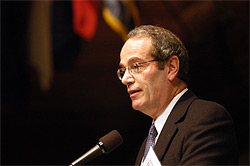
JONATHAN DAVIDSON: Thank you, Luis, for the introduction and also your invitation to take part in this very interesting event, and congratulations to you on the launch of the Center and this really important Forum.
The arguments for and against Turkish accession to the EU, in my view, can be grouped — perhaps oversimplifying, but for convenience, we can group them — into two groups: the identity issues, i.e., religion, culture, Turkey’s affinity with Europe; and the issues of scale, i.e., the huge size of Turkey, the population (which is very large), the cost to the budget of joining the EU and the voting weight that Turkey will have in the EU if it joins.
All of these arguments are finely balanced and there are respectable arguments on both sides of all of these issues — reasonable people can disagree. And, I think a very healthy debate has unfolded in Europe and in Turkey — as it should, and I think it should continue. So, I will certainly respect my good friend Corrado’s views, even if I don’t agree with them, because I know that they will be based on very strong convictions and sound principles.
First I should say that there are many complex technical and political and economic issues that will have to be sorted out before Turkey can join the EU, as Luis already alluded to. But, while these issues are under negotiation, there should, as I’ve suggested, also be a continuing debate because there’s a lot of reflection that needs to be done within the EU about our own identity as we contemplate taking Turkey on board; and there needs to be continuing reflection in Turkey itself. And during this reflection, I think that civil society on both sides should be strongly engaged because people, frankly, on both sides need a much better understanding. Europeans need a much better understanding than they have of modern Turkey. And, I think Turks, despite the very strong consensus that’s emerged in Turkey about joining the EU, still need to reflect fully on the implications of this very important step towards integration in Europe.
Now, as Luis has indicated, our discussion today is limited to the so-called identity issues that I outlined above, so let’s briefly take them in turn in the reverse order I mentioned.
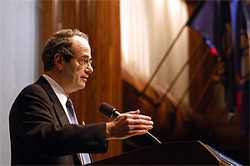
First of all, is Turkey European? Well, as a former president of the United States said, it all depends what you mean by “is.” (Laughter.) At least since Kemal Atatürk in the 1920s, Europeans have accepted Turkey’s European orientation. And I was taught in school half a century ago that Turkey in the 19th century was “the sick man of Europe.” I mention that only because it was just commonplace to think of Turkey as European then and for a long time. So, it’s nothing new to think about Turkey as European.
Frankly, the question is inconclusive, and I think will be argued until the end of time. However, what’s not inconclusive, what’s not in doubt, is the fact that Europe’s leaders, the EU’s leaders, have definitively accepted — since at least 1963 when we signed the first association agreement with Turkey — Turkey’s European orientation and destiny. And, they’ve declared this ever more specifically and unequivocally, particularly when things got serious in 1999, in 2002, and again last month in 2004 when all 25 heads of state and government declared unanimously that Turkey is not only eligible to join the European Union but the talks should begin seriously.
Now, I can see you all thinking, well, yes, but when did the European citizen have his or her say? Well, we’re a democracy. We’re all democracies and our leaders speak for our citizens. Giscard had his say; Corrado had his say, NGOs have their say. Forests are being felled in editorials throughout Europe. People have all had their say, and the European leaders declared, all 25 of them, that Turkey is a European state. So, that train has left the station.
For the EU to open the question now at this late stage whether or not Turkey is European would frankly be to renege on an explicit pledge we made in 2002 that if Turkey makes the far-reaching political reforms, the painful political reforms necessary to comply with all our political norms and values in the EU, then we will open talks without delay.
Well, Turkey in response undertook a remarkable program of reform, which most observers said was unthinkable before. So frankly, it would violate our own moral principles and values to go back on that pledge after Turkey has already played the game according to our own rules. I think as things go forward and the negotiations unfold, Turkey will probably move closer to European norms over the next decade or so. And conversely, had we said “no” last month in the EU, that would have been a serious break on the reform movement in Turkey. All the reforms in Turkey tell us that.
Now, as to geography, no one has ever precisely defined where Europe ends, and I can understand the arguments of those who say we should not stretch the frontier of the EU into the southern Caucasus or to meet the countries in the heart of the Near and Middle East. We shouldn’t be stretching the frontiers of Europe, they say, into Asia. But, since there isn’t a precise definition of where Europe ends, extending the frontiers of the EU to meet Syria, Iraq, Iran, Azerbaijan, Armenia – it’s a great opportunity. It’s an opportunity to secure Europe’s future in this most troubled set of regions. It’s an opportunity for Europe and the European Union to use its weight for good in this most troubled part of the world – frankly where our most important strategic challenges lie ahead. And Turkey will add considerably to the credibility of the European Union and the capacity of the European Union to exert a force for good in that region, projecting stability, security, and prosperity and reform.
Next in our list of identity issues is that of religion. The EU is not a Christian union. We had that debate in the convention and the ministerial conference that followed it last year that produced the Constitutional Treaty. God and Jesus lost, despite the best efforts of the Vatican. Europe is multi-denominational and it’s home to every known religion. As Luis said, we’re officially secular, just like Turkey. Excluding any country on the grounds of religion would contravene the EU’s fundamental values of tolerance and pluralism. It’s not on the agenda to exclude a country on the grounds of religion. In any case, if Turkey does join, it won’t be the only predominantly Muslim country. Albania will probably join at some point; Bosnia will probably join at some point.
A couple of days ago at lunch, the French ambassador, who like me, happens to be Jewish – and if that doesn’t challenge the notion that the union is a Christian union, I hope it does — eloquently defended his country’s decision to ban religious symbols in public schools. He pointed out that it reaffirms the 1905 law that is designed originally to protect religious minorities. And, a good Turkish friend of mine who happened to be sitting next to me noted that Turkey is closer in this respect to France than to America by keeping religious symbols out of public places. And, the ambassador also explained his government’s program to train imams so that a new generation of French Muslims can be brought up and educated in a spirit of tolerance without having to depend on radical extremist Islamists who have been shipped out of troubled and unstable Arab countries.
And my Turkish friend said that in this respect too, France is like Turkey: a secular state where religious teaching is conducted in an atmosphere of moderation and tolerance. Our moderator mentioned Joschka Fischer’s views, and like him and many others, I believe that the EU should embrace a Muslim country which espouses our values of democracy, human rights, freedom of expression, secularism in matters of state, religious tolerance, protection of minorities, the rule of law, a free market economy, and all the other bedrock social and political values that we hold at the core of our being.
Embracing Turkey in this way will send a powerful message globally, and I say that without claiming that Turkey is a bridge to the Arab world or a moderating influence or a model for other Arab countries. My good friend Omer is better qualified than me to say, but my sense is that such a notion frankly isn’t very congenial in Turkey or Arab countries because Turkey sees itself as closer to the heart of Europe in its traditions and history than to its Arab neighbors. But Europe does have a unique opportunity to demonstrate that Islam and modern democratic life can be compatible. And in the post-9/11 world, I ask you, can we afford to close our minds and our frontiers to this opportunity?
The concerns of many individual European citizens about admitting a Muslim country to the EU may arise partly from firsthand contact with poor immigrant communities from North Africa and Turkey. I don’t think that such immigrants necessarily represent the full spectrum of modern Turkey, and I don’t think they, frankly, have much relevance to Turkish accession to the EU. I think actually the opposite will occur if Turkey joins the EU. This will help to integrate and assimilate Muslims in the rest of the EU, but that’s a matter for long discussion.
It unquestionably will be very difficult to explain this to xenophobic-minded citizens and to the extreme right-wing politicians who of course are always ready to exploit their fears. I think for this reason we need a very ambitious and full-scale program of civil and cultural dialogue and exchange in education over the next few years to help.
Now, finally, there is the issue of the so-called “cultural gap.” This argument too loses credibility when you look a bit closer. We are no longer a homogenous community of six countries or nine. We’ve grown to a diverse – very diverse – multicultural, multi-ethnic union of 25. You can’t argue that Turkish culture is alien to the EU when our members will include Romania, Bulgaria, other Balkan countries, and many others. We rightly pride ourselves, in the union, on our cultural diversity. It’s fully compatible with shared fundamental values. I think, actually, Turkish society will greatly enrich our union, and we should celebrate rather than shun such an addition to our ranks.
Turkey combines the richest elements of European and Islamic history and culture with the aspirations of a young and modern nation looking to anchor itself firmly in the West as a pluralistic democracy and a vibrant market economy. I think it’ll bring diversity and energy.
[Adalet ve Kalkinma Partisi, which translates as “Justice and Development Party”]
To the point where these reforms become irreversible there’s great opportunity. And, having promoted and supported Turkish reform to this point so far, it would be entirely wrong, in my view, for the EU to reverse course. Turning our back on Turkey would stop the far-reaching reform process in its tracks, to our cost as well as Turkey.
So to sum up – we have got very limited time; I hope I haven’t overstepped it – let’s put it in perspective. The magnetic attraction of the EU has impelled many of our neighbors, Turkey being the latest and most striking example, to transform their societies in a way that will make them acceptable as EU participants. This is one of the great success stories of our era. Go back to the beginnings of European integration: it was launched to pacify the ancient hatreds of France and Germany and to resolve centuries of European civil war, and over the past half a century, as the European Union has evolved, we have been very successful in projecting stability, peace, security, and prosperity in our neighborhood, to our east and to our south, not to mention the whole range of democratic values.
So continuing to promote Turkish reform with a view to EU membership at the end of the rainbow, if you like, I think this can be the capstone of a remarkable story of democratic transformation and promoting the rule of law, human rights, market economies, fundamental values and prosperity throughout the European Continent. So if by the end of the negotiations Turkey meets the EU’s criteria – I hope, Corrado, this won’t be the end of a beautiful friendship – Turkey should join the European Union.
Thank you.
(Applause.)
MR. LUGO: Corrado.
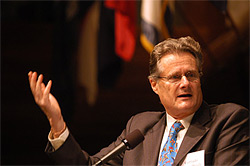
CORRADO PIRZIO-BIROLI: Our friendship is steadfast. Whatever happens, it will last.
I don’t disagree with what you said. You did an excellent job of defending the official view, and I would have done exactly the same if I had been in your place, but I am free; I’ve left. (Laughter.) So, I will speak for the opponents, which are numerous because many people don’t even dare to speak out. In Europe there have been fewer conferences than in the U.S. on this issue, by the way. And, there are a number of important problems, which I will refer to, but I want first to get out of the way the issue of religion, because that is not a problem.
There are those in Europe who cherish Christian values and want to avoid a pollution by other religious traditions. Others do not see a problem here as they cherish religious tolerance. I am among them. Religious denomination should not be a serious problem because religious tolerance is fundamental to the EU. Accusing all those who object to the accession of Turkey of Islamophobia or xenophobia is a very cheap shot.
By contrast, the role of religion in society is a fundamental element in a democratic state and a vast majority in Europe support the division between church and state and believe secularism to be part of modern Europe with no religion enjoying preference. Can one say the same thing of Turkey today or even tomorrow? We do not believe – we opponents – that accession will make any difference to the prospects of Turkish secularization. Whatever happens, I don’t think it will make a difference in principle.
Western advocates of Turkish accession consider it instrumental to build a bridge between Christian Europe and Muslim Middle East and Asia and to combine moderate Islam with democracy. Stuart Eisenstadt wrote that “If the EU wants to shape the Muslim world in a more secular democratic way, Turkish accession is the best way.” Should it really be the EU’s scope to shape the Muslim world? I know the Americans want to do it, but my question is, should it be the EU’s scope to shape the Muslim world, and should enlargement be the instrument to do so? It is a fact that the role of religion is not settled in Turkey and will not be for a long time, but so far, Turkey’s military has had to combat fundamentalism there. But, don’t forget that EU accession means weakening the military’s role in politics, as Turkey has already done. And in case there is a fundamentalist backlash, which can always happen – look at Ireland, the clash between the Catholics and Protestants there – would that mean that the military would have to take over again in Turkey, in contradiction with the rules? In any event, all I am saying is that the role of religion in Turkey is far from settled.
But let me come to the real point. An accession of Turkey to the EU would be unique in scope and degree compared, as Jonathan has said, to any other accession. Turkey is quite different in culture, geography and history; substantially larger, more populated and poorer; and its market is more protected than any of the previous cases.
Accession of such a country to the EU would have institutional and geostrategic consequences that could have a major impact on the kind of union that the EU would become. It could also have serious consequences for the EU’s existing common policies. It’s not a question of money, I think. Turkey would indeed have great difficulties in implementing the common agricultural policy and adopting the European social market economic model, with the risk of weakening both.
Member states are not prepared to fully fund Turkey’s accession costs. They didn’t fully fund the accession costs of the last wave, and I don’t think they would fully fund the accession costs of Turkey.
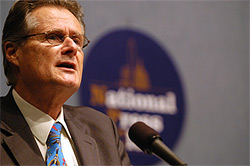
[European]
[Oguz]
The decision to start accession negotiations with Turkey was the most controversial decision of accession that has been taken so far. The arguments that won the day for Turkey last December were, first, that a promise had been made long ago, as Jonathan said — although that was the context of the European Common Market, I must say. At that time, we didn’t foresee much more in 1963. But, second, the heads of state in 1999 had decided to give accession status to Turkey, as Jonathan said. You know how long that decision took? Sixty seconds. You know what was the basis of that decision? No impact assessment, no paper, nothing. And the third argument was that Turkey had unquestionably made serious reform efforts, and these efforts deserved the prize it was seeking. And that is right in a way.
[Karel]
Two series of questions have been raised at various levels: How can the EU agree to negotiate with a country that does not respect U.N. resolutions, that illegally occupies EU territory, discriminates against EU citizens (who are the Greeks in Cyprus as well as in some islands in the Bosphorus), in contradiction with basic EU law?
Second point, if ratification of the EU constitution is considered necessary in order to preserve the EU’s decision-making capacity after the last enlargement, should it not first be ratified before further enlargement steps are taken? And, should a Turkish accession, if it takes place, not be accompanied by a further deepening of the EU beyond the constitution? None of these questions was properly discussed. There was no orientation debate preceding the commission recommendation, nor was there a proper impact study accompanying it.
As to the accession negotiations, EU law will need to be not only transposed but also applied regarding early chapters before new chapters can be agreed upon. Negotiations will be interrupted in case of human rights problems. At the end of the talks, each side must decide whether accession should actually take place or not.
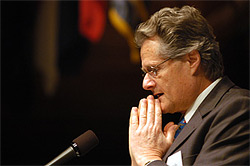
Now, what were the main concerns? Lack of time forces me to be selective. Let me start with geography and culture. The existing geographical definition of Europe: it ends at the Bosphorus and the Dardanelles, and, therefore, it has no borders with Iraq, Iran and Syria. The National Geographic Almanac of World History, which I happened to consult yesterday, specifies that Turkey is an Asia Minor country. Now, the other ingredients of European history – identity, culture and politics – have not been outlined so far in the enlargement context within the EU or discussed. For the National Geographic Almanac, all of Europe is the home of the Indo-European cultures, which are divided into several sections: Germanic, Greek, Slav, Baltic, et cetera, and only a limited number of peoples in Europe of Uralic culture, which are Finland, Hungary and some pockets in Russia. Turks are not part of that. In the National Geographic Almanac, they, as well as the Mongols, are of Altaic stock, as are the former Asian Republics of the Soviet Union.
It is mainly culture, not religion, which counts to define what is European. A sense of community is easier to establish among states with a common culture than with states that do not share the same culture. And cultural differences, as Jonathan said, are very big in Europe. Don’t think that between a Sicilian and a Fin there is much in common, and yet they’re all part of a common stock of Indo-European culture. And, therefore, we should take this into account.
Minister Erdogan himself asked Turkey not to be judged by its culture. What does this mean? That he realizes its culture is different. He is right. Can we compare family values in, for example, Anatolia with those in the EU?
The fact is that Turkey is a sui generis society. It has often been described as a bridge between Europe and Asia due to its historic ambivalence and shifting geographic location between Europe and Asia. But the Turkish government claims that Turkey does not want to be a bridge; it wants to become European.
In reality, as The Economist remarked recently in an article, Turkey is two countries. It has a small bridgehead in Europe with the Istanbul elite looking towards Europe, which Europeans know well. They are Europeans like all other Europeans. I mean, that’s very clear. And then it has another part which is largely in Asia. The bulk of it is an Asian country — I quote The Economist — which has little if any similarity with the EU in terms of law, culture and perspectives of change. The mass of Turkish society is unaware and uninvolved in all this.
Let me now come to my most important concern, which is the credibility, democracy, transparency and legitimacy of the Union. The EU may well have preserved its credibility with Turkey by acting on its promise, but has it preserved its credibility vis-à-vis its citizens and vis-à-vis the future of the Union itself? That is a real question.
There is strong public support in Europe for the Copenhagen political criteria, and to expanding them in as many countries as possible. But, commentators and the most informed citizens start wondering whether further European enlargement should simply be based on the political criteria of Copenhagen or also on the need for harmony with Europe’s gesellschaft and the EU identity project for every acceding country. The claim that values define Europe, as recently expressed by Commissioner Rehn — “values not borders” — is irrelevant and no strategy, I think. Or if it is, it means that the enlargement process must, or may progressively be, extended to all neighboring countries without defining the EU’s borders.
And, I think there are a growing number of people in Europe who worry about this because clearly they fear that the political finality of the EU is being ignored – that the aim of the Schicksalsgemeinschaft, often improperly translated, “a community of faith,” or better translated, “community of destiny” in Europe, has been abandoned. A majority of people in most EU countries, except four, are against accession. And, imagine that we are so prudent that we haven’t even included ever a question on whether Turkey is European in our Eurobarometer, which is our way of seeing what the people feel!
But, there are opinion leaders in Europe who are afraid of imperial overstretch and an overextension of the Union. In history, this has generally led to the defeat and the collapse of any political enterprise. And the risk that the European Union runs here is that it is clear that if Turkey comes in, there will be Georgia, Armenia, Moldavia, the Ukraine, and Russia and Byelorussia wanting to come in, which incidentally are all countries that have far more European credentials than Turkey.
But several other opinion leaders in Europe do not share these worries. They can be found both among the federalists and the intergovernmentalists. The latter because they want to create a directoire – a few countries, such as Britain, France, Germany and one or two others deciding for everybody else. The larger the Union, the more likely a directoire.
The many federalists, absurdly, are also in agreement with Turkish accession because they think that enlargement has gone too far; that the political project of the European Union is dead. And, therefore, if it is dead, it is better that the EU become large and larger because at that point, we will need to have an avant-garde – that is, a number of countries who go ahead on their own and leave the rest behind. But the avant-garde will never take place. Everybody will wish to be in the avant-garde and how could one refuse a country from joining the avant-garde if it applies to join? But, a number will come in to kill it. After all, some of the current members joined the Union determined to prevent a true political Union.
Let me conclude by saying I think that the way the European leaders have acted on Turkish accession is untransparent and undemocratic. They know there is a problem. They haven’t wanted to go into depth on the issue. They haven’t wanted to study the issue. Despite all their solemn statements of wanting more transparency and democracy, when push comes to shove, many European leaders seem to prefer to invoke “la raison d’état” and deal with particularly delicate issues in “camera caritatis.” They should not wonder, then, if EU citizens are uninterested in the Union and feel they should not go to vote.
Thank you very much. (Applause.)
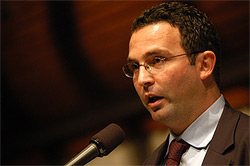
OMER TASPINAR: Thank you for inviting me. I think we’re lucky to have opponents such as Mr. Pirzio-Biroli to Turkey’s entry to the EU because it gives only more credence to the ones who want Turkey in the EU.
In a way, I think it’s interesting that you try to make three major points. And the first one, which was quite confusing for me, was that Turkey receives special treatment – that it starts accession negotiations without really deserving it. Nothing could be further from the truth. There has been serious scrutiny about whether Turkey complies with the Copenhagen criteria; and it does. And this was, believe me, not an easy process for Turkey. The decision was not taken in 60 seconds, but it was taken more like in 40 years.
Then there is the issue of widening and deepening the EU – whether the EU will be feasible with Turkey in. Now, that’s a legitimate question; that’s a very legitimate question. But, we’re lucky to have opponents such as you who pollute this debate with the cultural question. You started your talk by saying that this is not about religion; this is not about culture. But, it turned into a long tirade about why Turkey is not part of Europe on cultural grounds. How can it not be about culture then? Of course, then it becomes very relevant for the people who say that people who oppose Turkey have deep in their mind some cultural objections, and you proved it right.
Now, this is primarily a debate about what defines Europe. And, there are three ways of looking at Europe: culture is one of them, as Jonathan mentioned, and it is often used as a euphemism for religion and identity; geography is another; and values is another. We in Turkey, in civil society or in the government, believe that Europe is primarily about values. And, we are lucky to have people who are officially working for the commission, such as Olli Rehn, who have come to agree that this is about values primarily. And it is fascinating to me that people who leave the commission start talking this way. Maybe they shouldn’t be working for the commission to begin with if they strongly disagree with the commission’s view to begin with. Olli Rehn, in the article that you mentioned, defines Europe with values such as liberty, solidarity, pluralism, tolerance and human rights.
European vocation is another one of them. Turkey has a strong European vocation. Norwegians don’t, but Turks do – that’s a very important criterion. One should add to this definition of Europe – peace. Because Europe is primarily about war and peace, about constructing an entity which would make war obsolete in Europe. No one can today think about Germany and France going to war again. And thanks to the EU process, it is becoming more and more difficult for people to think about Turkey and Greece going to war again. This is the larger question we are dealing with.
In that sense, Europe is a postmodern construct, transcending balance of power, and transcending might-is-right approaches. It’s not about power and weakness, as Robert Kagan argues. It’s not about Europeans being from Venus, Americans from Mars. It is a deliberate choice. Even if Europe had military supremacy, military hegemony today, this concept of “soft power” would still be dear to the heart of Europeans because it’s more attractive for Europeans to think about soft power as one way of gaining legitimacy in world affairs. Europe is also about sharing sovereignty. It’s a deliberate choice coming from Europe’s own very bloody, agonizingly destructive history of the 20th century. This is a century shaped by two world wars. Therefore, Europe is a postmodern construct about sharing sovereignty.
And this quest for cultural purity, racial purity, religious homogeneity for Europe, and questioning Turkey’s identity, is to me in opposition with this idea of constructing a postmodern Europe based on multiculturalism, based on pluralism, based on democracy. Haven’t we learned that this impulse for homogeneity, this refusal of cosmopolitism and multiculturalism in the name of culture or religious identity or purity wrote the darkest chapters in European history, particularly in the form of Holocaust? Mr. Pirzio-Biroli needs no reminding of these tragedies in Europe’s not-too-distant history; he’s all too familiar with them.
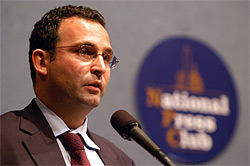
And, even if there is such an impulse for religious identity in Europe, about a sense of homogeneity, often legitimized in the name of historic consciousness, why should it exclude the scientific and philosophical contributions of Muslim civilizations to Europe? Isn’t the European Renaissance in many ways part of the contributions of Muslim civilizations – of the translations of great Muslim civilizations in Baghdad, Toledo, which translated the texts of Aristotle, which translated the texts of Plato, and of Protagoras, into Arabic, Persian, and Turkish, which were rediscovered during the rebirth of Europe with the Renaissance? Why should Muslim civilization be not part of Europe in this progressive vision? Why this quest for cultural homogeneity?
Today the clash of civilizations has turned into a self-fulfilling prophecy since 9/11, and Turkey is important not because of where it stands, or because of its sheer strategic value to Europe or the United States, but it is important for what it is – not for where it is but for what it is.
Turkey is a secular country, a Muslim country, a democratic country, and a pro-Western country. You don’t have many countries such as Turkey in the Islamic world. Yes, we have problems with our democracy; we are trying to become a better democracy. And the EU is helping just like it helped the Spanish democracy, the Portuguese democracy, the Greek democracy to turn from authoritarian regimes into more liberal democracies.
In that sense, it is crucial to understand that there is a larger picture here and that this identity question, this cultural debate, has turned into a national security priority. And we will see it; we will see it in national campaigns, in national security debates all over. Just one example: in 2006, there will be elections in Germany, and the SPD will probably try to win votes by putting Turkey as one issue in its foreign policy. The SPD embraces Turkey, whereas the Christian Democrats in Germany are favoring a “special partnership” with Turkey – often a euphemism, again, for marginalizing Turkey at the periphery of Europe without totally including it. There it would be very wise to use a slogan, such as – especially if you want to capitalize on anti-Bush feelings in Germany – one that would say, “America fights terrorism by invading Iraq; we fight terrorism by embracing Turkey” — just to give you an idea about the meaning of culture and civilization in the national security world. The war against terrorism cannot be won only by military means. You have to send strong messages to Islamic fundamentalists that this is not a war about civilization – that this war is for civilization, as Schroeder and Fischer argued. And Turkey is part of this. Sending this message to Islamic fundamentalists, Islamic radicals, is crucial.
I would also like to make a point about why the EU is so crucial for Turkey. We owe Turkish democratization in no small part to the catalysts, the incentives provided by Europe. To date, there is a strong alliance between moderate Islamists, moderate Kurdish nationalists and overall civil society – the press, military and civilian bureaucracy – about the necessity of joining the EU for democracy and prosperity. This is a crucial choice for Turkey. Take the EU out of this equation, and there would be serious problems in Turkish domestic politics. We need the EU, and the EU should be proud that it is spreading democracy – that it is basically strengthening democratic institutions in Turkey.
Now, imagine the symbolism of a political party with Islamic roots in Turkey, which made EU membership its top priority. This symbolism in itself, the fact that you have a political party that some people still think in Turkey is a political Islamic party, wants the EU. This is in itself a testament to the success of Turkish Westernization, to the belief that there is only one way of improving democracy in Turkey, by pursuing the values of Europe. In that sense, Europe is a great opportunity for Turkey, and Turkey should become a great opportunity as well because, thanks to Turkey’s inclusion, European bureaucrats and technocrats finally have a chance to argue that this project – that the EU project – is really about war and peace. It’s not about agricultural subsidies. It’s not about technocratic decisions.
If there is a democratic deficit today in Europe between the elite and the people, it’s because people are bored with the technocratic language of Brussels – with agricultural subsidies. They don’t see the EU as relevant to the larger questions of the day. Well, Turkey’s inclusion to the EU makes it more relevant. And, the way the EU was a catalyst for Turkish reforms, you can turn it around and argue that Turkey can become the catalyst for European structural reforms. Yes, the common agricultural policy needs total reshaping. Yes, Europe has serious problems such as unemployment. And, I think more rational people are not concerned about Turkish Islam, but they are concerned about unemployed Turks coming to Germany, coming to France and getting their jobs.
Therefore, Turkey is an occasion to address European unemployment, to address some of the issues such as: Why there are such labor rigidities? Is the welfare state in Europe viable? Will it be viable with Turkey in? And these are the public relations campaigns that will make it relevant for the EU and that will make it relevant for the European youth, which itself suffers from unemployment.
Finally, I would like to conclude by saying that for Europeans, keeping Europe Christian should not be the priority, and it’s not the priority. Europe is becoming more and more multicultural. There are already 15 million Muslims in Europe. Europe is also a continent where church attendance is going down, where secularism is strongly entrenched. The Europeans have a serious choice: they can either decide to keep Europe culturally homogeneous by excluding Turkey and use cultural arguments to exclude Turkey. Or they can see Europe as an opportunity to spread democracy and prosperity with European values to the troubled periphery of Europe. I’m talking about the Caucasus. I’m talking about potentially other countries which may have special relations with the EU.
Now, what would a good Christian prefer: to keep the continent pure and Christian or to spread prosperity and democracy?
(Applause.)
MR. LUGO: For very practical reasons, we decided not to have a fourth panelist here, but Omer, I’m going to turn to you and ask you to balance yourself out. We had two EU perspectives here – very, very different.
The way you stated the proposition for Turkey makes it sound as though the prospects of accession to the EU is a vital factor in helping the reformers within Turkey, from which one can conclude that there are some counter-pressures within Turkey on these matters of reform. So if you – if I – were to find your counterpart who would be skeptical from a Turkish point of view on this whole European Union business, what would they say?
MR. TASPINAR: Is this working? Okay.
Now, I tried to explain that there is a postmodern dimension in the EU, which Turks usually are also missing. The postmodern dimension in the EU is about sharing sovereignty. Turkey sees Europe in many ways as part of its democratization, Westernization identity project. However, the fact that Europe is also about sharing sovereignty in order to gain legitimacy is often missed by nationalist circles in Turkey who basically believe that Turkey is an exceptional country.
There is the same debate in Britain, by the way. Countries with strong imperial traditions are reluctant to share sovereignty. Therefore, for people who believe that Turkey is in a very dangerous neighborhood with neighbors such as Iran, Iraq, Syria, there is a tendency to say we cannot share sovereignty, that Europe should not really interfere with our domestic affairs.
However, I think the fact that 75 percent of Turks and all the segments of Turkish society within the bureaucracy, civil society and press are for EU membership shows that there is a stronger willingness to join Europe. And, we will learn about sharing sovereignty. This is a learning curve; this is a learning process for Turkey. We have 10 years, we are often told, for learning this during the accession negotiations.
Yes, there are people who are opposed to Turkey’s EU membership primarily because they don’t want to share sovereignty. And, there is also a major debate in Turkey about whether the political party in power is pursing all these reforms for tactical reasons in order to weaken the military. Well, I personally believe that the EU is the key to creating a stronger democracy for economic reasons. There will be a stronger middle class, which will itself embrace the project of democratization, and we won’t need the military or any kind of protective institution to keep Turkish secularism alive – that it will be the Turkish middle class itself which will embrace democracy and secularism. And, we have already established that. Turkey is already on the right path. Economic development is as important as political liberalization, and the EU is again key to that.
MR. LUGO: Thank you. Corrado, please.
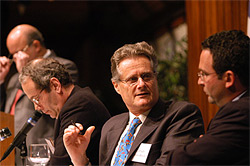
MR. PIRZIO-BIROLI: Well. Does this work?
I thank you for reminding me about history as I had been myself in a concentration camp for nine months. I think I am well reminded about this. And, this is exactly why I am so concerned about having a strong Europe and not an overstretched Europe, which wouldn’t work. It wouldn’t even be in the interest of Turkey or those who joined already, to join an organization, which is a United Nations sort of organization for the region of Europe.
My worry is that what is happening here is a matter of elites. It is the elites in Turkey. It’s not the Anatolian down on the ground. It is the elites in Europe and elites in Turkey who are driving this. And, I am very worried that the wish not to have a slap in the face of Turkey today could end up as a slap to Turkey at the end of the negotiations, which I think would be much worse in the event, which is I think likely, that one of the six to 10 referenda which will take place in the European Union will fail. Don’t think that the heads of state in government or the prime ministers will be campaigning very actively for the yes to accession. I was in Austria myself – I shouldn’t say so – but as an ambassador, and I can say very few politicians campaigned for accession to the EU because part of their parties were against, and, therefore, they preferred to be prudent.
[Jeremy]
Now, if the social economic model gets into trouble, then we aren’t anymore what we were supposed to be. And, this sharing of sovereignty, I think, is okay when it works. But the sharing of sovereignty is a very difficult thing to do. We have proved until today that more or less we could decide. There are big questions as to whether the EU of 25 has a possibility to decide as effectively as before, let alone a larger one.
And there is a bigger question if then one-quarter of the EU population is made up of the population of Turkey. It becomes more and more difficult to decide to share sovereignty. And, if that was the purpose, why not take in Iraq? I mean, once Turkey has become a member, you will have Syria and so on. There will be other EU neighbors keen to apply. Why not bring in other neighbors to promote democracy? Why not get up to Vladivostok?
The true question is, we need to define what it is to be European. The heads of state didn’t want to do so. Why? Because we don’t have a strategy, and, therefore, once we know that, we should say those are the limits of Europe; and this is where we will share sovereignty and not muddle through from one request to another without limitation.
Let me say a last thought that is to let you perhaps understand in the U.S. what the real problem is. Let me make an absurd comparison. Suppose that Mexico and Canada want to join the U.S. and be one federation for the North of America. That would be not so difficult compared to Europe because they are all of European stock. The Mexicans are more a sort of Spanish culture with some Indians, and Canada is also a European culture – that is very clear.
But, how would the Congress react? You have big difficulties at making decisions in Congress; it’s a very complex procedure. They take more time often than we do ourselves. But, what would Congress do? For NAFTA, Congress said yes by a whisker, and then decided in fact to regret it and certainly would not accept a common market let alone a union with Mexico.
But, suppose that the question here was sharing sovereignty – to have a union in North America, with the Mexicans bringing in socialists, with the Canadians bringing in liberals, who are to the left of the American Democratic Party with different traditions coming in, and the greater difficulty for the United States to make decisions. Suppose for a minute that Mexico wanted to join the U.S. – however unlikely – and that European leaders supported it – like Bush did about Turkey in regard to the EU. Would the U.S. applaud their stance? On Alaska, we didn’t say whether it should be in or not, and we are not saying now whether Puerto Rico should be in or not. That is part of your sovereignty. We are not meddling with the decisions that affect your institutions and your Constitution. It is your decision. And please, don’t meddle into decisions which affect our constitution or our institutions.
The question is: we need to have enough of a system of cohesion to be able to establish a unit. If you don’t want the power to be established in Europe, I understand all your reasoning. But, if you say that we should have a partnership with people being able to decide in common as much as possible – we are all of European stock as a basis. Well then, I think that you should give us the opportunity to decide for ourselves what is the best way to be a cohesive and strong union.
MR. TASPINAR: Just one minute.
MR. LUGO: One minute.
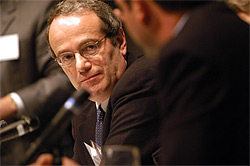
MR. TASPINAR: Look, I’m not American, by the way (laughter), but vocation, European vocation, that’s the key. I don’t think that Canada, America, Mexico, Russia have the European vocation that Turkey has. Second thing, contractual agreements and a sense of basic obligation to remain loyal to what has been promised; this is a process which started in 1963. In 1963, Russia was the Soviet Union. Ukraine was the Soviet Union. I’m not saying that you owe this to us, but we are deserving of it. We are winning it by applying the Copenhagen criteria.
Leave race, culture, religion out of this argument. You all have the right to object to Turkey, but once you put the question of culture, race, religion at the table, then of course, you have basically people who say this is not the real question. If you want to win this debate, if you have really decided that you wanted to keep Turkey out, talk about géométrie variable, talk about ways to keeping Turkey marginalized on technocratic grounds – something that Europeans are good at. But, culture makes you (chuckles) lose this argument.
MR. LUGO: Well, thank you, Omer. Unfortunately, we are under some very tight time constraints because the press club needs to rearrange this room starting at 11, and so, I’m going to make an executive decision here. The last five minutes, I would like to give over to an actually very important member of the audience who is here with us today, and is as well positioned as anyone to reflect upon the arguments here because she is in fact the point person for Turkey on political relations with the EU.
Asligul Ugdul, if you could come up, please. She is the director of political affairs at the EU secretary general, which is affiliated directly with the prime minister. Please come ahead.

ASLIGUL UGDUL: Thank you very much for giving me the floor, and I am honored to address such a distinguished group today. I will try to squeeze my presentation to five minutes, but I’m sure you will be forgiving as I arrived last night only for this purpose.
Well, does Muslim Turkey belong in Christian Europe? Or Turkey and Europe, do they fit in? This is becoming a popular debate in political and economic and intellectual circles both in Europe and Turkey. Turkey’s candidacy to the EU, which was endorsed by the European council here in Helsinki in 1999, was not a hot issue until the time came when the decision to start accession negotiations had to be made.
It seems that the closer Turkey gets to EU membership, the more public debate increases in Europe. Prejudices, doubts and misperceptions never cease to try to cast a shadow on our relations. In these debates, many arguments are being raised against Turkey ranging from its population, size, geography, religion and its Europeanness, to its religious and cultural background. We have witnessed that in some European quarters, the Turkish “peril” is rediscovered.
Then, when we look into the topic of discussion today, it is true that religion is an important component of Europe’s civilization, but it does not stand for its civilization alone. In the Middle Ages, Europeanness was clearly underwritten by Christian values. The Turks, representing Islam and the Orient, were then considered the “other” of Europe. Surprisingly, we see that the same pre-judgment prevails today in some circles.
Weighty claims about the culture that is regarded as alien seem to be spreading. One argument that is now gaining ground, especially in Catholic Europe, is linked to identity – namely Europe’s Christian values, which are mentioned as a reason for keeping Turkey out. In that case, it might just as well be argued that Greece should not have been admitted to the EU because of its Eastern Orthodox roots, that semi-Orientals such as Romanians and Bulgarians should be kept out too, and that Albania and Bosnia are forever doomed to be Muslim ghettos in Europe.
When we ask the question, “Does ‘Muslim’ Turkey belong in ‘Christian’ Europe?,” are we in a state of mind to ignore the fact that Islam is a mainstream religion in Europe today? There are today at least 15 million Muslims in the EU, which is more than, for example, the number of Protestant Scandinavians living in Europe. The trends towards a multiracial and multi-confessional Europe are, therefore, unstoppable.
Islam is thus already today an integral part of Europe and is a European religion. And, as we have been talking about Eastern Christianity, we will soon be talking about Western Islam. Islam must, therefore, be recognized and regarded as a domestic European religion. There is nothing which intrinsically prevents a Muslim from being as good a German as a member of the Protestant denomination, or an adherent of the Jewish faith, or that mosques cannot become as natural a feature of German cities as churches have always been in Istanbul, Damascus, or Cairo.
Only liberal Islam can be integrated into Europe, and such integration is only possible if it is paralleled by economic and social integration. A future Europe with a flourishing Muslim presence and an open European identity must, therefore, be based on self-criticism, a permanent and open dialogue, and the respect for diversity. We must realize that Muslims can make a positive contribution in the construction of a new Europe, while always remembering the role of Islamic scholars in the transfer of classical learning to the West. Their presence should be seen as a source of enrichment, not as a problem.
While elaborating on Turkey’s accession to the union, this should not be the prism that we look through. I suggest that rather than culturalist and essentialist discourses of Europe – which emphasize religion and geography over universal norms of liberty, democracy, rule of law, human rights and liberal economy – the principle of fairness and objectivity should be the basis of whether Turkey belongs to Europe or not.
Because fairness and objectivity have the potential to create a reciprocal relationship between Turkey and the EU, in which both parties have mutual benefits while accepting Turkey as a member of the EU, we will demonstrate that the process of European integration and its enlargement operates on the basis of universal norms rather than religion or geography. The project of Europeanization in Turkey makes a significant contribution to the process of democratic consolidation and societal modernization.
With its secular modernity and mostly Muslim identity, Turkey can contribute to the reshaping of the political identity of Europe as a multicultural space governed by universal norms of democracy and a liberal economy.
In short, I will also refer to – as previous speakers did – to Mr. Olli Rehn, the commissioner of the Union, who said geography sets the frame, but fundamentally, it’s values that make the borders of Europe. Furthermore, for the EU to deepen and widen, it should achieve not only political and economic integration but social and cultural integration as well. Otherwise, it will choose to close its doors to European countries with different social and cultural structures, which would lead to an exclusive club, creating new dividing lines in Europe. The outcome of the integration would then certainly be incomplete and disappointing.
For Turkey, the goal of integration with Europe did not emerge all of a sudden. It has deep historical roots dating back to the Ottoman Empire. During its early years, the empire was almost entirely a European empire, stretching from the Bosphorus all the way to the gates of Vienna in the European continent. For centuries, the empire remained an integral part of the politics, commerce, and/or culture of Europe, playing a crucial role in the balance of power and the shaping of policies.
As a Turkish scholar put it, we have to recall that the Young Turks were in Paris in the 1850s, and were much interested precisely in the Enlightenment. They were drawing on the works of Montesquieu, Voltaire, Rousseau and even Auguste Comte to such a degree that the political party that they formed was called Union and Progress. This was, as you will remember, a Comtean formula.
Even when it fell apart after the First World War, it had already enjoyed more than a century of reforms inspired by the Europeans. The Republic of Turkey, which in 1923 emerged from the ashes of the empire, kept alive the trend of Westernization initiated by its ancestors. Indeed, Europe had an ideological appeal for Turkey. Modernization was defined as Westernization or Europeanization.
In 81 years of its existence, Turkey never swayed from its dedication to freedom and democracy, even when the threats of totalitarianism were threatening the very foundation of most European countries. In the aftermath of the Cold War, Turkey took part in the quest to create a free, democratic and undivided Europe, something which is reflected in its support for the principles of the OSCE and the process of NATO enlargement. It goes without saying that the history of Europe cannot be written without the presence of Turkey and that Turkey’s bid for being part of the European integration process stems from its inherent historic and geographic European identity.
Since the establishment of the republic, Turkey chose Western Europe as a model for its new secular structure and rapidly undertook revolutionary reforms based on the contemporary system of values in all aspects of life, which later enabled the Turkish nation to participate in the value system shared by the European family of nations.
Accession to the EU will be the confirmation of Turkey’s century-long orientation towards the West. It will firmly anchor Turkey in the family of the European democracies. Turkey has undeniably proved that a predominantly Muslim society can attain contemporary standards of democracy, human rights and the rule of law. In fact, Turkey’s accession has implications beyond Europe. Our region and the Muslim world is closely following Turkey’s membership progress. Turkey stands as a striking example of what can be achieved through universal values. The repeated calls of the Turkish leadership to fellow Muslim countries to actively promote democracy and human rights constitute a powerful message.
Turkey’s initiatives serve to address the need for a healthier dialogue between the West and East at a time when mutual preconceptions have grown. In fact, Turkey’s accession will help to refute the theories of the clash of civilizations and the incompatibility of Islam and democracy. In short, Turkey has become a source of inspiration to those countries that have been unable to make the most of the benefits of sustained modernization. The union, on the other hand, now has a historic opportunity to reaffirm that its values are not tied to a specific religion or culture but are universal.
Last but not least, the true unity and diversity that is enshrined in the European Constitution as well can only be attained with the eventual accession of Turkey. Considering Turkey as non-European on religious and cultural grounds is an outdated vision of Europe.
Thank you. (Applause.)
MR. LUGO: You and Corrado will have a chance to continue the discussion later this afternoon at a seminar which we’re sponsoring for the two of them. So, thank you so much. I appreciate your patience. Typically, we end up taking quite a few questions from the audience, but we’re really under draconian measures here at the National Press Club, so we really do have to vacate.
Please join me though in thanking our speakers for this wonderful presentation. (Applause.) Thank you very much.
(END)




